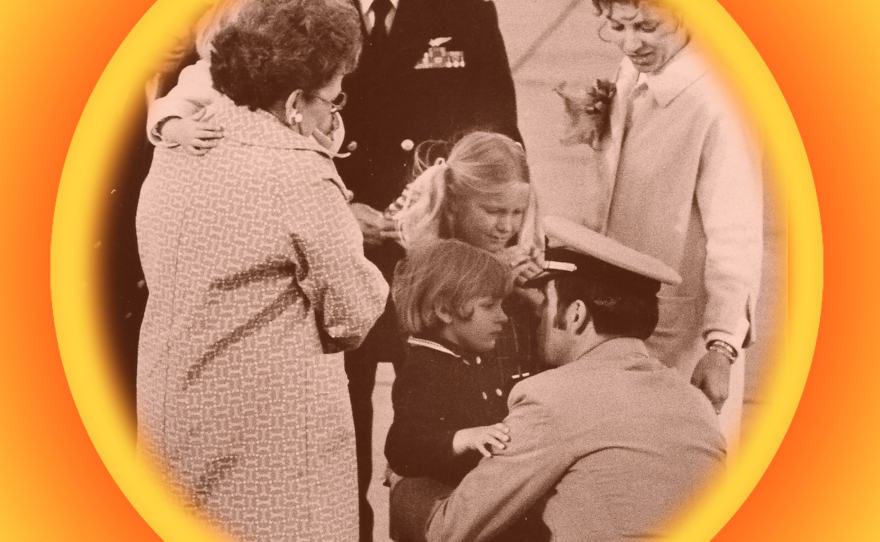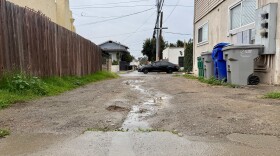The story of a needy families moved to San Diego back in the 60s. It's 1246. Capt. Jack Ensch, retired aviator, U.S. Navy moved to his shut moved to San Diego in 1966 to begin his military career. The Vietnam War was wrapping up. Here is an excerpt of his story from the podcast my first day which is produced and hosted by Andrew Bracken. We had a young child at the time. We were restricted and so we could do. We got here at the end of the week we had a few days to explore. We drove around, wait to see the ocean we were mesmerized. With the beauty in the vastness. We went down there and watched the sunset.:I would have brought them with a chance encounter he had in college. While studying to be as high school English teacher, he saw man in sharp naval uniforms. His interest was piqued and he enlisted. The idea of flying it's a four-year commitment. My wife is also a teacher. I joined. At that time, and in the Vietnam war broke out. After a quick training, he left for his first tour in Vietnam. First, he had to get used to combat. They would break in by flying missions down south in support of the troops because there wasn't that much antiaircraft fire. There was certain exhilaration to it. Someone he made some quotes about nothing more exciting than getting shot at and missed. It was the same thing, the first time you ever saw antiaircraft fire, that was an eye-opener. When you got moved up north, flying against the most heavily defended area in the world, that got your attention. Every time you went over the beach, you knew you were going to be shot out. You had to compartment allies and get the job done. The story dwelling on it, you never get your job done. When she get in the cockpit, the canopy closes, this is our office. He put all that stuff behind you and concentrate on the job in hand. Once you get back and land, the rest of those can come back. At the time, you put that out of your mind and concentrate on what you are doing. Worry about it when you get back. While in Vietnam, they shut down to any fighters leading to multiple awards and a surprising reunion 40 years after. This is the highlight of fighter aviation to be able to engage in a fight against enemy aircraft. That's what you train for. Is the Super Bowl of your training. Iron River that distantly. We engaged six enemy fighters, we shut down to ourselves. The second kill was off of our when man's tale coming in and we managed to shoot that off him before he shot are we man down. Last April, I was back in Vietnam for the first time since I came home. We had a meeting with 16 N. enemies pilots that we flew against in the war. I got to meet one of the six pilots. We talked it out 44 years after the fight and we both remembered like it was yesterday. I was here, that was me. We talked about it and talked through the fight. As if it happened yesterday. In aviation, there is no hatred, you're fighting another airplane and trying to survive. Aviators surround the world the same. It's a certain mindset and attitude that most aviators share no matter what country they are in. There is no animosity, let bygones be bygones. In the air, you're trying to fight the other airplane. You admire the person for the way they maneuver. It's a skill against skill. It turns out he is a retired colonel, I am a retired captain. It's the same rank in their service. I have three daughters, he has three dollars. I have five grand children, he has seven pendulum. At the outside of the arena, we are living grandparents. There is an ironic parallel that both of us retired at the same rank, both of us were married and had three daughters. I laughed and said, I can be in the air but you me in the grandchildren. He laughed and said that's true. It was very rewarding. After all the combat he saw, he avoided thinking about being shot down by the enemy as much as possible. He almost made it to the end of the war unscathed. It was intense. The more you did it, the better you got. He took and attitude that's always going to be the other guy. That worked for four cruises and 280 combat missions before finally it was me. We were taken under fire by several service to air missile batteries and we outmaneuvered several. I watched one behind us harmlessly. Operating electronic gear from the panel down here like that. I had my hand up in a handhold keeping myself up from the gees we were pulling and all of a sudden, one we didn't see flew up over the canopy and everything came crashing down on top of the aircraft. I remember my words exactly. There was a huge explosion the shrapnel and everything coming in. I said oh my God, no. I thought oh no, it's happening to me. That was Capt. Jack Ensch, retired aviator, U.S. Navy speaking on the new podcast, my first day. It's produced and hosted by Andrew Bracken. To listen to the rest of his story as a prisoner of war, go to KPBS.org/podcast.
KPBS is exploring new ways to create stories you want to listen to, particularly stories that originate right here in San Diego.
San Diegans share the story of their first day of living here in a new podcast.
"My First Day" is a podcast produced through the KPBS Explore project, an initiative to bring original content from and about the San Diego community. Andrew Bracken produces and hosts the podcast.
The fifth episode brings us the story of Capt. Jack Ensch who moved with his young family to San Diego in 1966 to begin his military career as a naval aviator. This coincided with the time that the Vietnam War was ramping up.
New episodes of the podcast will be released each week, and excerpts will be played on KPBS Midday Edition on Wednesdays.






